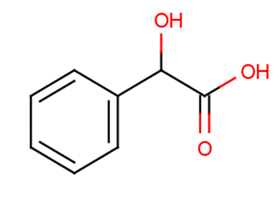
DL-Mandelic acid
CAS No. 90-64-2
DL-Mandelic acid( acidomandelico )
Catalog No. M19671 CAS No. 90-64-2
It is an isomer of cresotinic acid (2-hydroxy-3-methylbenzoic acid) and oxymethylbenzoic acid (2-methoxybenzoic acid). Derivatives of mandelic acid are formed as a result of metabolism of adrenaline and noradrenaline by monoamine oxidase and catechol-o-methyl transferase.
Purity : >98% (HPLC)
 COA
COA
 Datasheet
Datasheet
 HNMR
HNMR
 HPLC
HPLC
 MSDS
MSDS
 Handing Instructions
Handing Instructions
| Size | Price / USD | Stock | Quantity |
| 1G | 27 | In Stock |


|
Biological Information
-
Product NameDL-Mandelic acid
-
NoteResearch use only, not for human use.
-
Brief DescriptionIt is an isomer of cresotinic acid (2-hydroxy-3-methylbenzoic acid) and oxymethylbenzoic acid (2-methoxybenzoic acid). Derivatives of mandelic acid are formed as a result of metabolism of adrenaline and noradrenaline by monoamine oxidase and catechol-o-methyl transferase.
-
DescriptionIt is an isomer of cresotinic acid (2-hydroxy-3-methylbenzoic acid) and oxymethylbenzoic acid (2-methoxybenzoic acid). Derivatives of mandelic acid are formed as a result of metabolism of adrenaline and noradrenaline by monoamine oxidase and catechol-o-methyl transferase. It is also present in certain skin care products is an intermediate molecule in the production of other biochemicals may be used as an analytical reagent and is a precursor in the manufacture of dyes. Mandelic acid is found to be associated with phenylketonuria which is an inborn error of metabolism.
-
In VitroMandelic acid ((±)-Mandelic acid) exhibits significant sperm-immobilizing effects and caused mild plasma membrane injury, suggesting that it has potential for development as a future non-surfactant spermicide.Mandelic acid, an alpha-hydroxyacid derived from the hydrolysis of an extract of bitter almonds, has been studied extensively for its possible uses in health care products, such as photoaging, irregular pigmentation, and antimicrobial.
-
In Vivo——
-
Synonymsacidomandelico
-
PathwayProteasome/Ubiquitin
-
TargetEndogenous Metabolite
-
Recptorothers
-
Research Area——
-
Indication——
Chemical Information
-
CAS Number90-64-2
-
Formula Weight152.15
-
Molecular FormulaC8H8O3
-
Purity>98% (HPLC)
-
SolubilityDMSO:10 mM
-
SMILESOC(C(O)=O)c1ccccc1
-
Chemical NameBenzeneacetic acid alpha-hydroxy-
Shipping & Storage Information
-
Storage(-20℃)
-
ShippingWith Ice Pack
-
Stability≥ 2 years
Reference
1.Strittmatter M Isenberg E Grauer M T et al. CSF substance P somatostatin and monoaminergic transmitter metabolites in patients with narcolepsy.[J]. Neuroscience Letters 1996 218(2):99-102.
molnova catalog



related products
-
Butyrylcarnitine
Butyrylcarnitine is a plasma metabolite that is an indicator of abnormal metabolism due to disease and is used in the diagnosis of heart failure and pancreatic cysts.
-
3-Hydroxybutyric aci...
3-Hydroxybutyric acid sodium (β-Hydroxybutyric acid sodium) is a metabolite found in type I diabetic patients that regulates membrane lipids.
-
Isoproterenol
Isoproterenol (Norisodrine) is a non-selective and orally active β-adrenoceptor agonist.Isoproterenol is a potent peripheral vasodilator and bronchodilator.



 Cart
Cart
 sales@molnova.com
sales@molnova.com


